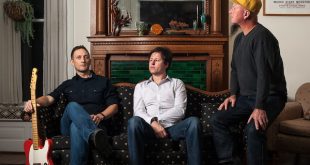It's been said that the career of the late, legendary Johnny Cash was bookended by two distinct periods — the beginning and the end.
The beginning, meaning his early recordings first for Sun Records and then for Columbia. This is where Cash first established his legend with such albums at Live At Folsom Prison and the string of great songs like "I Walk The Line," "Hey Porter," "Ring Of Fire," and "A Boy Named Sue."
Then there was the end, and the great series of American Recordings he made with producer Rick Rubin. These were the career closing records made from the mid-'90s right up until his death a few years ago. On these albums, Rubin most often stripped Cash down to the barest essentials of just a guitar and that unmistakable voice of his, for a series of starkly recorded albums that drew more confessional as he approached his final appointment with his God.
On some of these songs, such as his cover version of Nine Inch Nails "Hurt," the way that Cash confronts his mortality is so profound it literally brings tears to your eyes. It is a remarkable series of records.
In between these two very distinct periods however, was what many fans simply refer to as "that other stuff," as Cash seemed to become creatively adrift. During those "other years" in the middle of his career, Cash made everything from gospel records to ill-conceived record label driven efforts to "modernize his sound" (something Rubin did much more effectively by simply stripping it bare).
This newly unearthed and mixed concert — where Cash is captured live in 1990 during a concert in Asbury Park, N.J.. — was recorded toward the end of that period, just a few years before his partnership with Rubin would revitalize his career and insure his legacy ended on a high note.
The one-hour concert kicks off with a spirited version of "Ring Of Fire" that finds Cash sounding strong in both voice and spirit. The band clicks along behind him like a well-oiled machine, and the sound mix here is absolutely pristine.
On the very next song, Cash is joined by the sweet sounding voices of the Carter family for some downhome gospel on "Life's Railway to Heaven." The gospel continues with the only known recording of "Wonderful Time Up There," which Cash introduces with several of this show's wonderful stories — this one about "chopping wood with his daddy."
By the time Cash introduces "Folsom Prison Blues," — with his signature "Hello, I'm Johnny Cash" — it's clear that everyone onstage is loose and having a great time, and that this indeed is going to be a very special evening with the then living legend. Continuing the upbeat mood and humorous stories, Cash dedicates Kris Kristofferson's "Sunday Morning Coming Down" to the singer, "who just had a birthday — he's 81" (wouldn't that make Kristofferson something like 100 years old today?).
Things turn more serious with "What Is Man," a song that Cash had just written at the time, which reflects on mortality and man's relationship with God (a theme which would repeat itself numerous times in Cash's final recordings with Rubin). Cash trades both verses and harmonies here with Lucy Clark. Not to sound cliched here, but on this gospel tune Ms. Clark sings like an angel herself.
Things get rocking again with "Come Along Ride This Train." Cash then tells the story of when a levee broke, as he segues effortlessly from the chugging of that particular train, to the flood waters of "Five Feet High and Rising." From there, it's pretty much a non-stop ride with the band slowing down only long enough for Cash to relate yet another great story. The band shows the kind of chops here that could only come from years of playing countless one-night stands. The only thing that seperates one song from another is a drum roll, and another story.
In one of the funniest stories, for "Ragged Old Flag," Cash talks about how he appreciates the freedoms we enjoy, saying, "I appreciate the right you have to burn your flag, as long as you appreciate my right to bear arms, so I can shoot you if you try to burn mine." Although rightwing nuts might today latch onto such a statement as evidence of blind support, the story is told with such humor that you can't help but wonder if Cash himself didn't see the joke there.
As the concert draws to a close, Cash is joined by his singing and life partner June Carter for spirited versions of "Jackson," and "Wreck of Old '97". Hearing June belt out her lines here, it isn't hard to see just what Johnny Cash saw in her. She sounds like she was one tough broad here (forgive me ladies, but I just can't think of a better way to describe it). June also cracks wise here at poor old "John's" expense.
For the homestretch, the hits keep on a comin' like the chugging of a freight train, from "Hey Porter," to "Ghost Riders In The Sky," right on through to the closing "I Walk The Line".
So somewhat surprisingly considering the period during this concert was recorded, The Great Lost Performance proves to be exactly that. Johnny, June, and the rest of the band are captured here on what was clearly a magical night.
I still wouldn't recommend too many of the studio records recorded around this time. For someone seeking the best introduction to Johhny Cash, I'd just start with Sony's The Essential Johnny Cash, and the Unearthed box set of the American series with Rubin.
But The Great Lost Performance makes a great addition to any collection of Cash's live recordings.
 Blogcritics The critical lens on today's culture & entertainment
Blogcritics The critical lens on today's culture & entertainment



